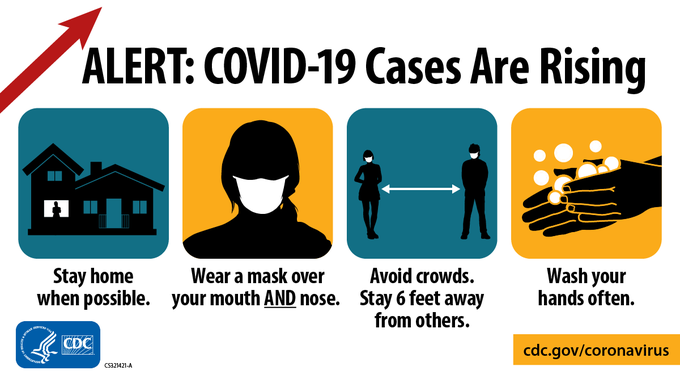As more transmissible variants of the coronavirus spread, the CDC says wearing a cloth mask over a surgical mask offers increased protection against the virus.
The Centers for Disease Control and Prevention (CDC) found that wearing a cloth mask over a surgical mask offers more protection against the coronavirus, as does tying knots on the ear loops of surgical masks.
For optimal protection, the CDC says to make sure the mask fits snugly against your face and to choose a mask with at least two layers.

In laboratory testing, CDC discovered that wearing a cloth mask over a surgical mask, and tying knots on the ear loops of surgical masks and then tucking in and flattening the extra material against the face produced substantially improved protection against transmission of and exposure to infectious COVID-19 aerosols.
“A well-fitting masks provided the greatest performance at both blocking emitted aerosols and exposure of aerosols to the receiver”, CDC Director Rochelle Walensky said. “In the breathing experiment, having both the source and the receiver wear masks modified to fit better reduced the receiver’s exposure by more than 95%, compared to no mask at all.”
Walensky said the laboratory findings underscore the importance of wearing a mask correctly and ensuring it fits snugly over your nose and mouth.
Correct and consistent mask use is a critical step everyone can take to prevent getting and spreading COVID-19. Masks work best when everyone wears them, but not all masks provide the same protection, according to the CDC. When choosing a mask, look at how well it fits, how well it filters the air, and how many layers it has.
Two important ways to make sure your mask works the best it can:
- Make sure your mask fits snugly against your face. Gaps can let air with respiratory droplets leak in and out around the edges of the mask
- Pick a mask with layers to keep your respiratory droplets in and others’ out. A mask with layers will stop more respiratory droplets getting inside your mask or escaping from your mask if you are sick.
Where your mask after receiving the vaccine
No one knows and there is no ongoing research to determine how well do the approved Pfizer and Moderna vaccines protect against asymptomatic infection and thereby help achieve herd immunity And, the other looming mystery is how long vaccine-induced immunity lasts.
Do the Covid-19 vaccines prevent transmission? Because of flawed study designs, we don't know https://t.co/zBmHK9SjlY
— Bloomberg Opinion (@opinion) February 11, 2021
References:









